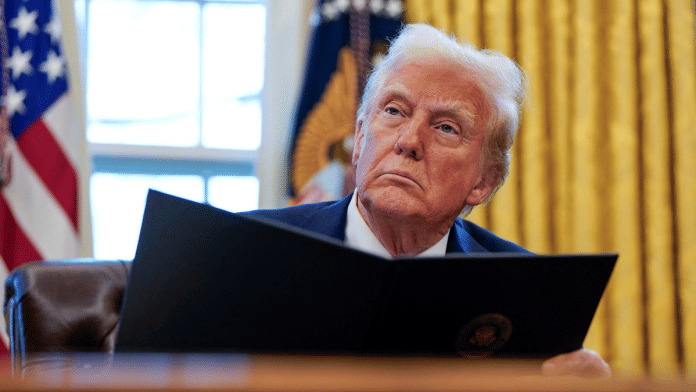Thank you dear subscribers, we are overwhelmed with your response.
Your Turn is a unique section from ThePrint featuring points of view from its subscribers. If you are a subscriber, have a point of view, please send it to us. If not, do subscribe here: https://theprint.in/subscribe/
President Trump’s executive order, Ending Radical and Wasteful Government DEI Programs and Preferencing (Executive Order 14151), mandates the cessation of diversity, equity, and inclusion (DEI) programs for U.S. federal agencies and government contractors. This move marks a dramatic reversal of previous policies that encouraged workplace diversity, and its consequences are extending well beyond government work.
The corporate world is now scrambling to adapt, with multinational companies preemptively scaling back DEI initiatives in anticipation of broader regulatory scrutiny and shifting public sentiment. On February 5, 2025, Attorney General Pam Bondi reinforced the administration’s hardline stance, announcing that the Justice Department would investigate and penalize DEI programs in the private sector that violate federal law. This signals that DEI, once a corporate priority, is now a legal and financial risk in the U.S. and beyond.
The global repercussions of Trump’s crackdown are becoming evident. Companies with substantial U.S. exposure—such as Meta, Alphabet, and Amazon—are walking back their DEI commitments, even outside American borders. Google has recently eliminated its diversity hiring targets, citing the need to comply with evolving legal and policy landscapes. Meta has disbanded its DEI oversight teams, while Amazon has signaled an end to certain diversity initiatives by the close of 2024. These rollbacks reflect not just regulatory caution but also growing resistance within workforces that perceive DEI policies as prioritizing quotas over qualifications.
From DEI Mandates to Business Risk
DEI, which refers to corporate policies aimed at increasing workplace representation across gender, race, and other historically underrepresented groups, has been a defining trend of the past decade. However, the Trump administration’s latest policies have transformed DEI from a corporate virtue to a liability.
While DEI still enjoys broad support, a growing number of employees are voicing concerns. A 2023 Pew Research Center survey found that 56% of employed U.S. adults believed that focusing on increasing DEI at work was positive, while 28% were neutral and 16% viewed it negatively. However, a follow-up 2024 Pew survey indicated that support had declined to 52%, while disapproval rose to 21%.
This subtle but significant shift in sentiment aligns with companies’ decisions to soften their DEI commitments to avoid political and legal headwinds. In tech and finance—two industries historically at the forefront of DEI—firms are quietly retreating from diversity benchmarks. Google’s move to end hiring quotas exemplifies how even progressive companies are stepping back to mitigate legal risks.
The Global Domino Effect
The consequences of Trump’s anti-DEI stance are not confined to the U.S. Many of the corporations affected by these policy shifts operate internationally, meaning that once American-based legal, financial, or reputational concerns force DEI reductions, similar strategies are applied worldwide.
Take Accenture, which generates approximately 8% of its revenue from U.S. federal government contracts. The consulting giant has scaled back its global DEI commitments, citing the need to realign with shifting legal and economic realities. Similar patterns can be seen at other multinationals that have both American government contracts and global operations. As the legal risks of maintaining aggressive DEI programs rise in the U.S., companies are adjusting their global approaches to mitigate exposure.
Even in regions like Europe, where DEI remains widely accepted, corporate leaders are beginning to reassess their DEI strategies. European tech executives are closely watching DEI rollbacks at U.S. companies like Meta and Amazon, anticipating similar pressures in European markets. Oxford professor Michael Smets notes that “global companies have global policies,” meaning that American DEI trends often influence European firms.
Additionally, businesses in the UK and Europe are evaluating their DEI commitments due to shifting political sentiment and legal uncertainty. While there is no widespread DEI rollback in Europe yet, some firms are modifying the structure and visibility of their DEI programs to prevent future regulatory conflicts.
At the global level, 40% of executives worldwide now view DEI initiatives as polarizing, reflecting the increasing politicization and legal examination of such programs.
What Comes Next for DEI?
With Trump’s policies redefining corporate risk calculations, DEI is being reshaped into something more subtle and legally resilient. Rather than headline-grabbing diversity quotas, companies are pivoting to less controversial forms of workplace inclusion.
Corporate leaders are increasingly focusing on merit-based hiring, skills-based development programs, and general workplace equity, avoiding policies that could be interpreted as preferential treatment. Companies with global operations will likely continue supporting diversity efforts but may reframe them under broader workplace wellbeing or leadership development strategies to sidestep political backlash.
The ultimate test for DEI’s future will not be whether it disappears but how it evolves. If Trump’s executive order marks the beginning of the end for legally enforced DEI policies, the corporate world must decide how to maintain inclusive workplaces without inviting legal or political retaliation.
These pieces are being published as they have been received – they have not been edited/fact-checked by ThePrint


